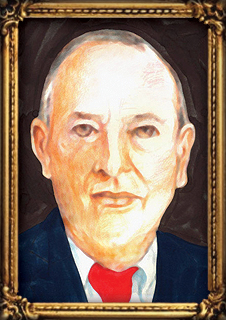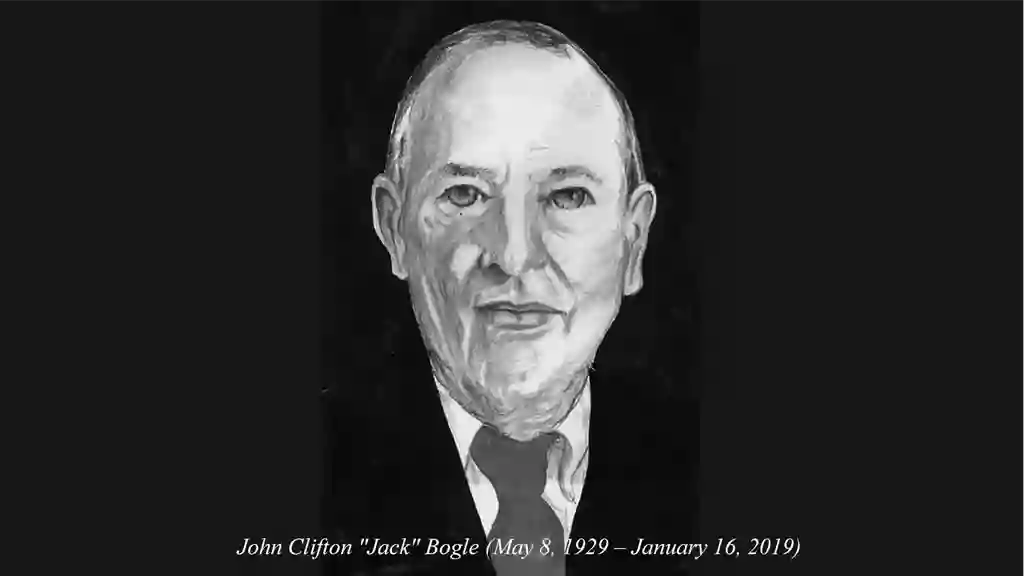 A true investing icon, Vanguard founder John Bogle, passed away in early 2019 at age 89. Besides creating a fund company that grew while he was alive to serve more than 20 million investors worldwide, his pioneering work included development in 1976 of the first index mutual fund designed for mass consumption.
A true investing icon, Vanguard founder John Bogle, passed away in early 2019 at age 89. Besides creating a fund company that grew while he was alive to serve more than 20 million investors worldwide, his pioneering work included development in 1976 of the first index mutual fund designed for mass consumption.
To IFA's Founder and CEO, Mark Hebner, Bogle was as an investing luminary. "John Bogle was the inspiration for starting Index Fund Advisors," he said. "After reading his first books and before starting IFA, I moved all of my personal investments to Vanguard. He's been an enormous influence on my entire career and the building of IFA."
Besides reshaping an entire industry by creating a mutual fund that passively follows the S&P 500 Index, Bogle was a prolific author. Among his dozen books were "Common Sense on Mutual Funds" and "The Little Book on Common Sense Investing: The Only Way to Guarantee Your Fair Share of Stock Market Returns."
Looking Out for Investors
Long before fiduciary care became a popular calling card in financial services, Bogle sought to establish a legacy of helping others "get it right." As he told me in 2006: "The concept I've used throughout my career is to create a system that can best serve each individual and each situation at a time."
Bogle started the Vanguard Group in 1975 with some $1.4 billion in net assets. By the time he stepped down as chief executive and chairman in 1996, Vanguard had $180 billion in assets under management. By the time of his death in 2019, the funds complex managed nearly $5 trillion in assets.
During a speech at Harvard University after he'd started Vanguard, Bogle urged business students to strive in their work to a higher calling. "When you can work well with other human beings and help human beings, it's more than just a great business strategy," he said. "It's also a great way to build a well-rounded and fulfilling life. It's something you can take home with you after work."
Bogle's career didn't follow a straight line. "Success takes a little bit of determination," Bogle related to me in an interview. "And it probably takes a little bit of some people getting mad at you. I regret that — I'd like everyone to love me."
Friends Called him 'Jack'
Besides everything else, perhaps one of Bogle's most appreciated legacies to those who knew him was a never-ending sense of optimism.
After rough market conditions in 1974, Bogle was fired as CEO of Wellington Management. The venerable fund company had been his only employer since graduating from college more than 20 years earlier.
"I had to pick myself up and form Vanguard," Bogle said. "But I don't recall being discouraged."
His friends simply called him "Jack." And, by all accounts, he had many. A prime example is how Bogle's new firm got off-the-ground. An early boost to his fledgling business came from deals to handle other managers' back-office and administrative duties. Many of those early Vanguard customers were connected in one way or another to the very company that had just pushed him out the door.
"When he worked at Wellington, Jack had arranged a merger with another company," former Vanguard Chief Investment Officer Gus Sauter explained to me years ago. "When their executives came on-board, they had strong representation on Wellington's management board. But they didn't have control of the boards set up to oversee the individual funds."
As a result, the fund executives were able to give contracts to Bogle's new firm for the back-office administration of hundreds of millions of dollars in assets.
Moving Away from Brokers and Commissions
That was just a start. Bogle also saw opportunities to reform an American marketplace in which funds were sold almost exclusively through brokers. "The thinking was that the more commissions you got paid, the more mutual funds you sold," he observed.
Such a commission-based distribution system in Bogle's mind was "corrupting" the industry and souring many individuals on investing their hard-earned money in financial markets. "The mutual fund business isn't full of bad people," he told me. "The problem is that under the old rules, the incentive isn't always going to be for the broker-dealer to do what's best for the investor."
At Vanguard, Bogle wound up cutting the umbilical cord with brokers. "It was a very risky strategy," Sauter said. "When Vanguard told brokers they weren't going to get paid for selling its funds, they weren't too happy."
Bogle took the long view, however. While no-load funds weren't new at the time, it was still very much a niche marketplace. Few were willing like Bogle in the '70s to base an entire business on it; even fewer were able to build scale and prosper.
While cutting out brokers and other middlemen might've provided the sauce in Bogle's investing soup, his real success came through an even bolder move -- bringing to market the first "retail" index mutual fund.
Pioneering an Index Funds Approach
Rather than hiring high-cost managers to pick stocks, Bogle and his staff cut deals with index providers like Standard & Poor's to create funds that tracked these benchmarks. Their concept was greeted with widespread skepticism. Many in the industry publicly scoffed at it, referring to Vanguard's fund that mirrored the S&P 500 Index as "Bogle's folly."
But index investing using no-load mutual funds just made too much "common sense" to Bogle. So he persevered, and within a few years, his S&P 500 "experiment" grew to become the world's biggest mutual fund.
In 1981, Dimensional Fund Advisors (DFA) emerged to help pioneer even more advances in the field through the creation of mutual funds that systematically invest in factors known to drive higher expected returns. These include tilting to stocks with smaller capitalization sizes, higher book-to-market ratios (value) and greater profitability.
Given such innovations in the field, IFA favors DFA's mutual funds and exchange-traded funds, which are designed and managed to incorporate such evidence-based and scientific advances identified by leading academics. At the same time, our investment process remains indelibly tied to traditional indexing strategies pioneered by Bogle at Vanguard.

The Best of Both Worlds
IFA continues to monitor and assess new funds and indexing methodologies. Still, our investment committee is loathe to jump on the active management bandwagon. As we've written in the past:
"We do find that select enhancements to traditional indexing readily support and improve our passive management strategy in designing globally diversified portfolios of mutual funds and ETFs. In particular, IFA finds that Dimensional's academic rigor and systematic investment process continues to provide our clients consistent and efficient access to key markets and asset classes. Our research shows that DFA's highly structured trading methodology is executed in a fashion that reduces both implicit as well as explicit management and operational costs to fund investors."
A wealth of top-drawer academic evidence exists today showing how a tilt to key factors like size, value and profitability serves to enhance an IFA Index Portfolio's expected return. Specifically, we've observed in the "Blurring of the Lines" article:
"IFA's ongoing market analysis gives us confidence that Dimensional's eligibility and weightings guidelines used to manage its funds continue to hold true to modern indexing's most fundamental and important characteristics."
This is not to be construed as an offer, solicitation, recommendation, or endorsement of any particular security, product or service. There is no guarantee investment strategies will be successful. Investing involves risks, including possible loss of principal. IFA Index Portfolios are recommended based on time horizon and risk tolerance. Take the IFA Risk Capacity Survey (www.ifa.com/survey) to determine which portfolio captures the right mix of stock and bond funds best suited to you. For more information about Index Fund Advisors, Inc, please review our brochure at https://www.adviserinfo.sec.gov/















